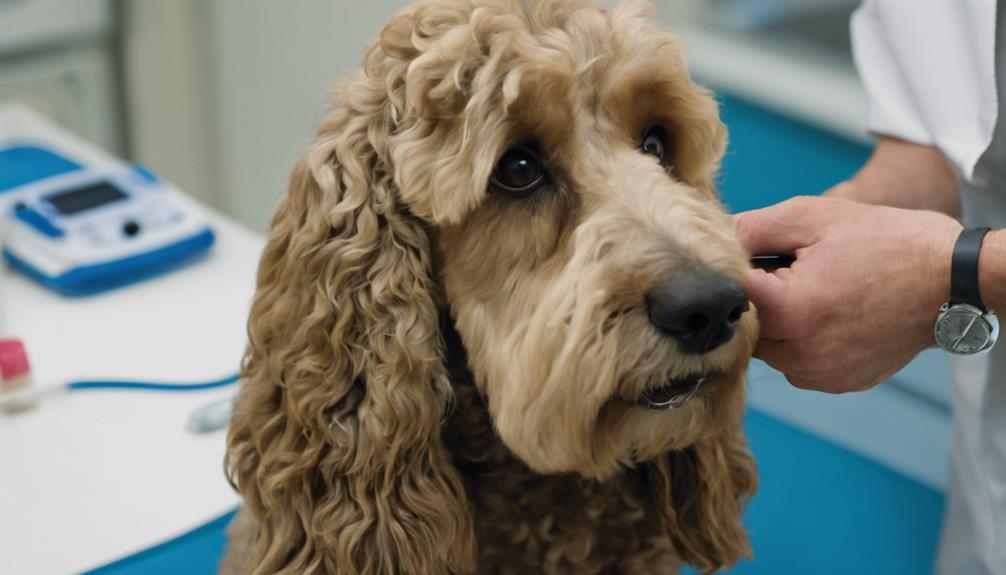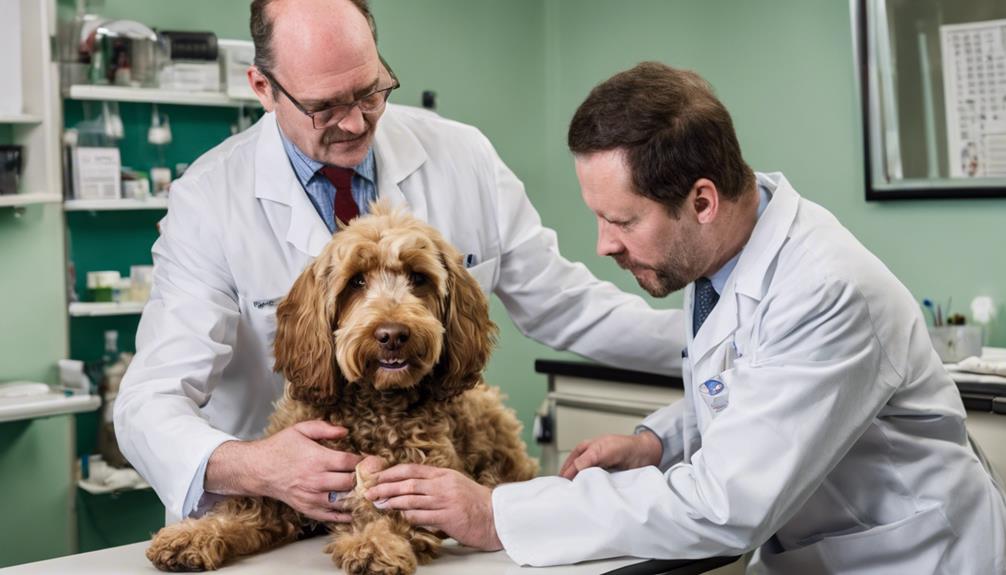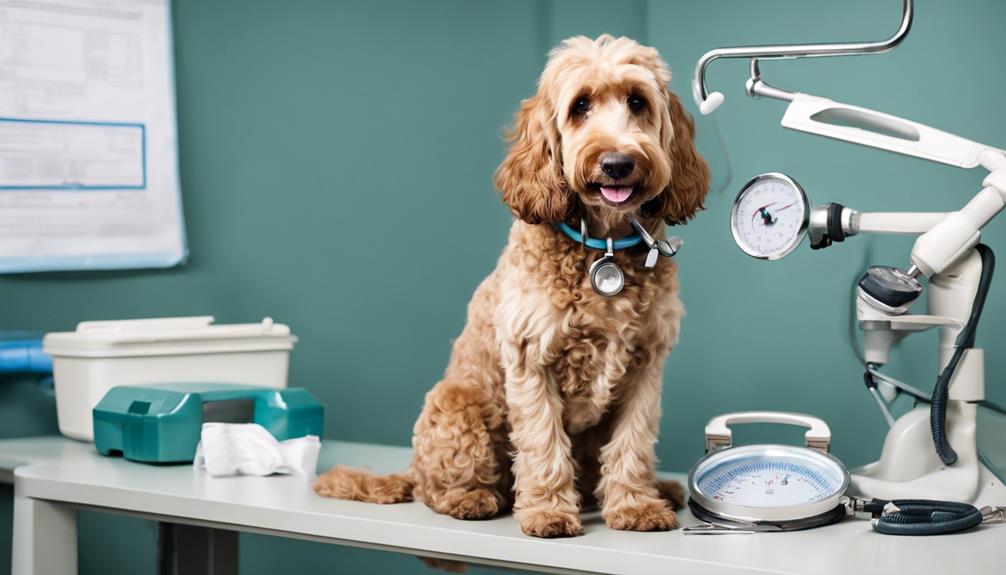Did you know that despite their adorable appearance and friendly nature, cockapoos can be prone to certain health issues? As a cockapoo owner, it’s important for you to be aware of these concerns to ensure your furry friend stays in the best possible health.
From common allergies to more serious conditions like hip dysplasia, there’s a lot you need to keep an eye out for. We’ll discuss these issues further, arming you with the knowledge you need to keep that tail wagging for years to come.
Key Takeaways
- Cockapoos are prone to health issues like ear infections, hip dysplasia, and progressive retinal atrophy.
- Regular vet check-ups are vital for early detection and treatment of health conditions in cockapoos.
- Providing cockapoos with a high-quality, balanced diet can help prevent health problems.
- Regular grooming and routine health maintenance, including vaccinations and dental care, are crucial for cockapoo’s wellbeing.
Understanding Cockapoo Breed Health Risks

As a potential or current cockapoo owner, it’s crucial you fully grasp the specific health risks this breed commonly faces to ensure your furry friend’s optimal wellbeing. Understanding the cockapoo lifespan and genetic predispositions can help you provide the best care for your pet. Cockapoos generally live between 12-15 years, but they’re predisposed to certain health conditions such as hip dysplasia and progressive retinal atrophy. Regular vet check-ups are necessary to detect these issues early.
Common Allergies in Cockapoos
Beyond the common health conditions, your cockapoo may also be at risk for certain allergies, a concern that requires equal attention and understanding. Among these, Food Sensitivities and Seasonal Allergies are common. Food sensitivities can manifest in many ways, from digestive issues to skin problems. Ingredients like corn, wheat, soy, and certain proteins can trigger reactions. Being mindful of your cockapoo’s diet can help identify these sensitivities.
Seasonal allergies, on the other hand, occur due to environmental triggers such as pollen, dust mites, or mold. You might notice your furry friend itching, sneezing, or having watery eyes. Regular vet check-ups and understanding their triggers can help manage these seasonal allergies, making your cockapoo’s life comfortable.
Hip Dysplasia Concerns in Cockapoos

You should know that hip dysplasia, a common skeletal condition, can pose a significant health risk to cockapoos. Understanding how this issue affects this breed, including signs and symptoms, is crucial to maintaining your pet’s wellbeing.
Further, we’ll discuss preventative measures and treatments available to manage this condition effectively.
Understanding Hip Dysplasia
What exactly is hip dysplasia, a health issue frequently seen in cockapoos? It’s a genetic condition, often revealed by dysplasia diagnostics, that leads to abnormal development and eventual degeneration of the hip joints. Due to genetic predispositions, cockapoos are more susceptible to this condition.
Understanding the key aspects of hip dysplasia will help you better care for a cockapoo:
- It typically manifests during growth spurts.
- Signs include pain, stiffness, and difficulty moving.
- Early detection can greatly improve prognosis.
- Treatment varies from lifestyle adjustments to surgery.
Knowing these factors will ensure you’re prepared and proactive in maintaining your cockapoo’s health. Remember, knowledge is the first step toward a healthy, happy Cockapoo.
Cockapoos and Hip Problems
Now that we’ve covered the basics of hip dysplasia, let’s explore the specific concerns related to this condition in cockapoos. Cockapoos, due to their genetic predisposition, are at a higher risk of developing hip dysplasia. This condition affects the joint connecting their hip and thigh bone, causing discomfort and difficulty in movement.
It’s crucial to observe your cockapoo’s exercise regimen as excessive or inadequate activity can exacerbate this issue. Look for signs like difficulty standing up, reluctance to exercise, or an unusual gait. Remember, early detection can greatly improve your pet’s prognosis. Notably, these signs don’t confirm hip dysplasia, but they warrant a veterinary consultation.
As a cockapoo owner, understanding these concerns equips you to better care for your companion.
Preventive Measures and Treatments
To ward off the risk of hip dysplasia in your cockapoo, there’s a slew of preventive measures and treatments that can be adopted. You don’t have to navigate this alone; you’re part of a community of cockapoo caretakers who face similar challenges.
Your pup’s overall health, including their dental care and vaccination schedule, can significantly influence their hip health. Here are some preventive steps to consider:
- Regular exercise to maintain a healthy weight
- Providing a balanced diet to support bone health
- Keeping up with routine dental care, as oral health can impact overall health
- Sticking to a consistent vaccination schedule to fend off diseases that could exacerbate hip problems.
Cockapoo Eye and Ear Health Issues

Have you ever wondered about the eye and ear health issues that your cockapoo might face? Like all breeds, cockapoos can be susceptible to certain health conditions. During puppy teething, cockapoos may scratch or rub their eyes, leading to potential infections or injuries. Also, cockapoos are prone to genetic disorders such as Progressive Retinal Atrophy, a disease that gradually diminishes eyesight.
Your cockapoo’s ears are also important. Their floppy ears can trap moisture, creating a breeding ground for bacteria and yeast, resulting in infections. Regularly checking their ears for any abnormalities and keeping them clean can reduce this risk. Remember, maintaining your cockapoo’s health requires vigilance and regular check-ups with your vet.
Grooming for Cockapoo Skin Health
Proper grooming is key to maintaining your cockapoo’s skin health.
Let’s discuss how to care for their unique coat and the steps you can take to prevent skin conditions.
It’s not just about aesthetics; it’s about providing a healthy environment for your furry friend.
Cockapoo Coat Care Essentials
Maintaining your cockapoo’s coat is crucial not only for their adorable looks but also for their overall skin health. Proper grooming, including brushing techniques and understanding the diet impact, can significantly improve the quality of your furry friend’s coat.
Follow these essential cockapoo coat care steps:
- Regularly brush your cockapoo using proper techniques. This will help to remove loose hairs and prevent matting.
- Feed them a balanced diet. The right nutrients can greatly impact the health and shine of their coat.
- Use dog-appropriate shampoos and conditioners that are gentle on their skin.
- Keep them hydrated. Just like in humans, hydration plays an important role in maintaining a healthy coat.
Preventing Skin Conditions
To ensure your cockapoo’s skin stays healthy and free from conditions, it’s essential to incorporate skin-focused grooming habits into your pet care routine. Regular brushing not only reduces tangles but also stimulates skin oils, promoting a healthy coat.
Flea control is crucial in preventing skin irritations and infections. Using vet-approved products will effectively keep these pesky parasites at bay.
Dietary influence plays a significant role in your cockapoo’s skin health too. A balanced diet, rich in Omega-3 and Omega-6 fatty acids, can enhance your pup’s skin and coat condition significantly.
Importance of Regular Vet Check-ups

Regular check-ups at the vet are vital for your cockapoo’s health, helping to prevent and detect potential health issues before they become severe. These visits are a prime opportunity for your vet to develop an appropriate Vaccination Schedule and advise you on Dietary Requirements.
During these check-ups, your vet will typically:
- Review and update your cockapoo’s vaccinations, if necessary
- Conduct a thorough physical examination to detect any signs of potential health issues
- Discuss and recommend suitable dietary requirements for your cockapoo
- Provide valuable advice and answer any questions you might’ve about your cockapoo’s health
Frequently Asked Questions
What Specific Nutritional Needs Do Cockapoos Have to Maintain Their Overall Health?
You’ve to consider a balanced cockapoo diet plan, enriched with protein, fiber, and vitamins. It’s crucial for their overall health. Also, be mindful of potential food allergies for effective allergy management.
How Much Physical Exercise Does a Cockapoo Require Daily to Stay Healthy?
Your cockapoo needs about an hour of physical exercise daily. Try swimming; it’s great for their joints. For rainy days, indoor exercises like fetch or hide-and-seek can keep them active and happy.
What Are Some Mental Health Concerns Common in Cockapoos and How Can They Be Addressed?
Cockapoos can suffer from anxiety and boredom. You can address these mental health concerns through anxiety management techniques like regular exercise, mental stimulation, and socialization techniques like exposing them to varied environments and experiences.
What Are Some Common Behavioral Issues in Cockapoos Related to Their Health?
You’ll find cockapoos can develop behavioral issues like excessive barking or chewing due to health concerns. They’ll need proper grooming and training to overcome these challenges, ensuring their mental and physical health stays tip-top.
Are There Any Specific Vaccinations That Are More Important for Cockapoos Compared to Other Breeds?
As a cockapoo owner, it’s key to ensure routine vaccinations like rabies, distemper, and leptospirosis. Important to note, specific parasite protection and allergy prevention measures might be more vital for this breed than others.
Wrapping Up
Maintaining your cockapoo’s health involves understanding potential breed-specific issues. Be aware of common allergies, hip dysplasia, and eye and ear concerns.
Regular grooming helps keep skin health in check. Don’t underestimate the importance of routine vet check-ups; they’re essential for early detection and treatment of health concerns.




